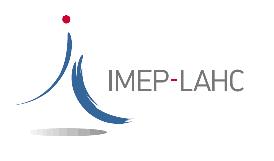Capteurs sur silicium-sur-isolant basés sur le potentiel hors-équilibre
Publié le : 25 mars 2022
 Capteurs sur silicium-sur-isolant basés sur le potentiel hors-équilibre
Capteurs sur silicium-sur-isolant basés sur le potentiel hors-équilibre
Date limite de candidature : 23 May 2022
Début du contrat : 1er Octobre 2022
Place:
IMEP – LAHC, MINATEC – INPG, 3, Parvis Louis Néel, 38016, Grenoble
Advisor:
Irina Ionica (Associate Professor Grenoble ING)
Contact:
Irina IONICA +33 (0) 4 56 52 95 23
Context and objectives:
Among the sensing devices, the ISFETs (Ion Sensing Field Effect Transistor) occupy an important position thanks to many possible advantages, such as easy co-integration with reading circuitry. However, one of the difficulties when using ISFETs, especially for in-liquid sensing, is that the presence of the gate liquid on the top, close to the channel, can damage the MOSFET. Alternative architectures such as extended-gate FETs¹ can partially solve this issue. In such a case, the sensing part (which is in contact with the liquid) is separated by the transducer (the MOSFET) and this ensures a longer lifetime of the MOSFET, without suffering from any damage due to liquid.
Additionally this separation also allows envisioning hybrid architecture with a silicon-based MOSFET and a sensing region the uses “eco-friendly” / sustainable materials, eventually very cheap and disposable.
The objective of this thesis is to test the possibility to implement such a sensing configuration, using a simple transistor fabricated on silicon-on-insulator (SOI). Besides the novel architecture, the originality of the topic lays in the signal used for the detection: instead of a classical shift in the current through the transistor, the sensing will be done based on the out-of-equilibrium body potential, a phenomenon specific to SOI devices² In our group, we showed that the body-potential response is due to the presence of the Schottky barriers at the contacts³ and that it can be used for sensing4 However, progress is still needed to go from a “laboratory” nice reading paradigm towards a more realistic device with optimized performances in terms of linearity, sensitivity, noise and consumption and this is the aim of this multidisciplinary thesis.
Research to be performed:
In order to reach a pragmatic sensor, starting from our previous proof-of-concept studies some additional steps are needed:
- validate the out-of-equilibrium body potential signature for an extended-gate FET configuration
- optimize the device architecture for sensing, in order to exploit at best the physical mechanisms responsible for the out-of-equilibrium potential
- find the appropriate dynamic conditions of potential reading
- implement a sustainable sensing layer as extended gate for a realistic bio-chemical application.
The PhD student will develop the complete chain, from device fabrication, electrical measurements in equilibrium and out-of-equilibrium conditions, surface functionalization for specific detection applications (collaboration with Néel Institute, LMGP…). The experimental characterization part will be completed by
segments of modeling and simulation, allowing the comprehension of physical phenomena involved and the
optimization for the sensor.
Knowledge and skills required:
This PhD topic belongs mainly to the field of micro-nano-electronics, and more precisely to the sensing with ISFETs fabricated on SOI substrates. The candidate must have a solid knowledge of physics of semiconductors and devices. Electronics of the measurement systems, surface functionalization would be appreciated. The candidate is expected to enjoy experimental work and the development of adapted measurement protocols.
Scientific curiosity, motivation, creativity are mandatory qualities in order to take full advantage of the scientific environment of this thesis and to gain excellent expertise for his/her future career. The topic is in the field of applied physics, but close to the fundamental physics, as well as to the industrial world.
After the PhD, the candidate will easily adapt to both academic and industrial research environments.
The candidate must have a very good academic record, with high grades.
____________________________________________________________________________________________
1 Won-Ju Cho, Cheol-Min Lim, Sensing properties of separative paper-based extended-gate ion-sensitive field-effect transistor for cost
effective pH sensor applications, Solid-State Electronics, Volume 140, pages 96-99, 2018
2 M. Alepidis, A. Bouchard, C. Delacour, M. Bawedin and I. Ionica, « Out-of-Equilibrium Body Potential Measurement on Silicon-on-
Insulator With Deposited Metal Contacts, » in IEEE Transactions on Electron Devices, vol. 67, no. 11, pp. 4582-4586, 2020
3 Alepidis, M., Ghibaudo, G., Bawedin, M., & Ionica, I., Origin of the Out-of-Equilibrium Body Potential In Silicon on Insulator Devices With Metal Contacts. IEEE Electron Device Letters, 42(12), 1834-1837, 2021
4 Alepidis, M., Bouchard, A., Delacour, C., Bawedin, M., & Ionica, I., Novel pH sensor based on out-of-equilibrium body potential
monitored in silicon on insulator with metal contacts. In ECS Meeting Abstracts (No. 59, p. 1589). IOP Publishing, 2021



 Contactez-nous
Contactez-nous Plan d’accès
Plan d’accès









